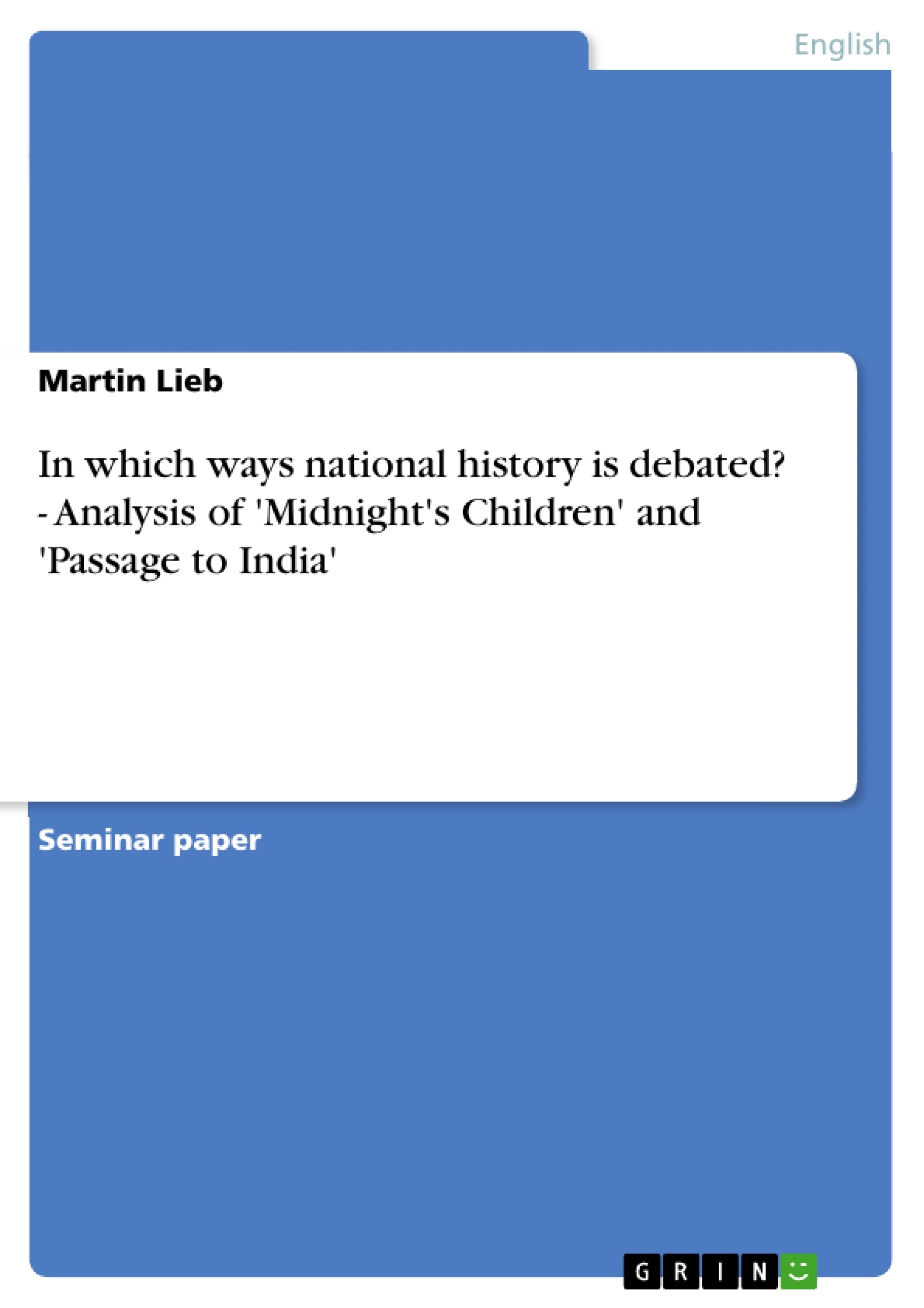In my essay, I will talk about Midnight’s Children (1995,ed.) by Salman Rushdie and E.M. Forster’s A Passage to India (1989,ed.). I may not always be totally directed towards the essay question but make a general comparison of the two novels as well. I will discuss the way in which India is presented in both texts and talk about national identity.
In modern literature, often the private is political and the political is private. In reality it’s not. Cultures and societies function totally different from individuals. But both Forster and Rushdie use their characters as metaphors for their countries and cultures. A novel lives from its characters and allows deep insights in their minds, foremost its hero’s and its narrator’s. Saleem is the main character of Midnight’s Children and tells his lifestory to Padma, in A Passage to India there is an omniscent narrator who comments a few times on his own account.
Rushdie’s Saleem is modern India and the relationships between Forster’s characters symbolize the cultural conflict of the Empire and its colony. Saleem’s family history and genealogy is the Indian history, with its complex mixture of British imperialism and traditional Indian culture. East vs. West, and Rushdie admits the British a prominent role in modern India. Even though they were usurpators the Indians seem to have taken over parts of British culture and try to make their way into modernity, which is a Western, occidental, project. The linkage between history and fiction, Saleem and India, is obvious. Rushdie tries to tell the story of his country and he is probably aiming at a Western audience. The autobiographic impulses in his works are very important, and Saleem’s life and family tree has obvious similiarities to Rushdie’s. He makes excessive use of his creative freedom, and it is never clear where reality ends and fiction begins. He certainly wants to express with it the irrationality of Indian culture, its faible for myths and magic, surrealism. The novels were written and take place in totally different times: Midnight’s Children is postcolonial, A Passage to India takes place at the height of the British Empire, where its downfall is already visible, though. The novel has a definitely tragic, pessimistic and melancholic undertone, as many novels written at the turn of the century or after World War One, at the prime of novelwriting culture. The bourgeoise world, the creator of the genre, was falling apart; the mood at the end of the 19th century and inbetween the two world wars was definitely apocalyptic. Forster makes many references to the reality of the Indian and British relationship and the history of this colony, but his characters are not elevated to the representation of a whole nation as Saleem is.
Table of Contents
- I. Introduction
- II. Main Part
- III. Resumé
- IV. Bibliography
Objectives and Key Themes
This essay compares Salman Rushdie's "Midnight's Children" and E.M. Forster's "A Passage to India" to analyze the portrayal of India and its national identity. It explores the complex relationship between the private and political, using the characters as metaphors for the countries and cultures they represent. The essay aims to shed light on the impact of British imperialism on Indian culture and how this influence shapes the nation's identity.
- The relationship between individual narratives and national history.
- The influence of British colonialism on Indian identity.
- The contrasting cultural perspectives of East and West.
- The concept of national identity in a postcolonial context.
- The role of mythology and culture in shaping national identity.
Chapter Summaries
- I. Introduction: The introduction presents the two novels, "Midnight's Children" and "A Passage to India," as examples of how national history is debated through literature. It highlights the intertwined nature of the private and political in both texts and how the characters function as metaphors for their respective countries and cultures. The essay also introduces the concept of national identity as a central theme and emphasizes the influence of British imperialism on Indian culture.
- II. Main Part: This section delves into the portrayal of India in both novels. It explores the clash of cultures between British and Indian characters and analyzes the struggles of understanding Indian culture from a Western perspective. The essay examines the role of mythology and traditional Indian culture in both texts, emphasizing the complex relationship between East and West. It also touches upon the concept of freedom and its impact on Indian society.
Keywords
The primary keywords and focus topics include: postcolonial literature, national identity, British imperialism, India, cultural conflict, East-West encounter, mythology, and the private/political relationship.
- Citation du texte
- Martin Lieb (Auteur), 2003, In which ways national history is debated? - Analysis of 'Midnight's Children' and 'Passage to India', Munich, GRIN Verlag, https://www.grin.com/document/91581



